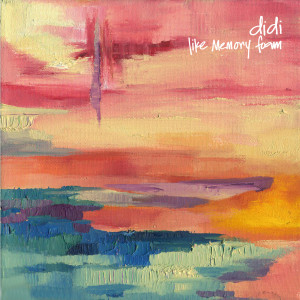
Artist
IMAGES: To download, click above.
didi
Damnably
didi found one another on the edges of the Columbus OH music scene in 2013. At University, singer/guitarist Meg Zakany and drummer Sheena McGrath began jamming together as a means of exorcising life’s frustrations, then drafted in two musicians they’d admired from afar in the local DIY scene: singer/guitarist Kevin Bilapka-Arbelaez and singer/bassist Leslie Shimizu. The band find some of their musical inspiration in the unpredictable structure of Sonic Youth’s songs as well as in their willingness to craft a sound that generally eschews a single charismatic leader in favor of allowing all members the freedom to write and sing. didi also admire Built to Spill for their ability to layer guitar melodies and angelic vocals.
All American, with roots in Japan, Colombia, and Mexico, didi are four friends who by embracing their different backgrounds, creative ambitions and songwriting styles, seek to give context and bring personal depth to the music they make together and embody their belief in positive communication between people of underrepresented backgrounds as a means to grow an environment, within the band and outside of it as well.
On their sophomore album, like memory foam, Zakany, Bilapka-Arbelaez and Shimizu all lend their voices to songs that seek to explore, among other things, the power of an ambiguous identity, be it in terms of race, gender, class or otherwise, to navigate difficult or guarded conversations (“anzaldúa”); the pain of forgetting what once seemed to be an unforgettable love (“heavy ghosts”); and the sting a woman is capable of in the face of an unchecked man socialized to underestimate her (“moon jelly”).
“anzaldúa” references Gloria Anzaldúa’s book Borderlands, where the Chicana feminist defines the power of having an identity, racial or otherwise, made up of complex intersections and from ambiguous origins. Bilapka-Arbelaez sings in the chorus: “I snuck into your homogenized hegemony and moved shit around/made my way into your sense of insecurity and laid right down to sleep” emphasizing the power intrinsic to possessing a diverse background when it comes to infiltrating groups that might be hostile or ambivalent toward outsiders who would seek to disarm their prejudices.
“heavy ghosts” is a love letter written to the memories of an ended relationship, memories strong enough to mold what feels like a ghost that still haunts the places touched by a past love, a ghost that one tries to exorcise, only to summon it back again when faced with letting go.
On “moon jelly” Zakany reflects on the feeling of not being acknowledged or seen, references the allure of moon jellyfish as something to be admired but surprisingly deadly, “watch me closely, and i’ll pull you in.” and draws comparison with the underestimated natural power women possess: “so she flows, in bloom, moon jelly, the thought of her sting, tender, unnerving.”
circles is written in a cyclical way as Zakany explores the synchronic nature of life and loss: “when all you want is more time to hold onto feeling alive, but time lapses ending where it begins.”
The song “muerde” is pointedly sang in Spanish about the death of the “American Dream” and the struggle to stand back up in spite of cynicism and bigotry. Bilapka-Arbelaez sings “Una araña en la sombra me araña el hombro mientras duermo, y me envenena el sueño” which translates to “a spider in the darkness bites me as I sleep and poisons my dream” referring to the experience of falling into complacency, and how often, one dose of reality can be enough to make those feelings of contentment crumble. An allegory to the undercurrent of racism and bigotry that has been ‘exposed’ recently, a “wake-up call” to many, yet something that has been a constant for some time to those not privileged enough to be able to ignore it.
didi has showcased at SXSW 2018, completed on a US tour this past July, and have shared stages with Speedy Ortiz, Saintseneca, Japanese Breakfast, Jay Som, and Sad13. like memory foam is out November 23rd on Damnably.
Where does the name “didi” come from?
Her name is Dorothy Sugawara-Shimizu. She is both Leslie’s grandmother and our inspiration. Dorothy, or Didi, as her grandchildren call her, was born and raised in Seattle, Washington, in the 1920s. Until quite recently, Didi kept most of her history to herself, not wanting to burden anyone with the information, and telling them “I didn’t really think my story was that different from anyone else. Everyone has their story.” But Didi’s story is different. She was taken from her home in Seattle at the age of 13. She was put into an internment camp in Idaho for 2 years. She was treated as an illegal alien and faced her teenage years in a windstorm of adversity. But the reason we chose to honor her is not solely because of the struggle she faced, but is so that her story and the story of every woman will be told. We want her to know that her life and her story matter, and that we will be telling it for as long as we can. We want her to know that her quiet strength has given us inspiration to be loud. And we need her to know that she will be remembered and immortalized in our music.




